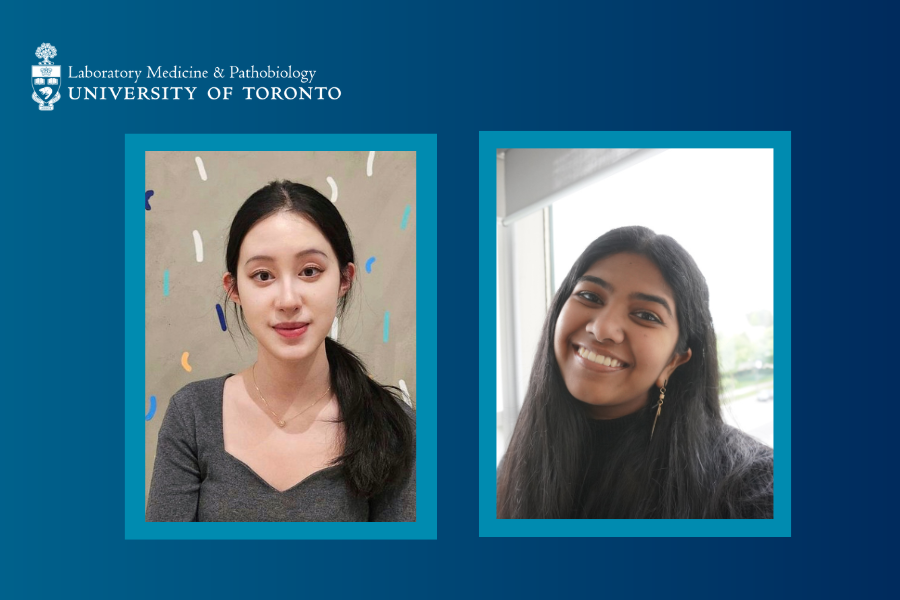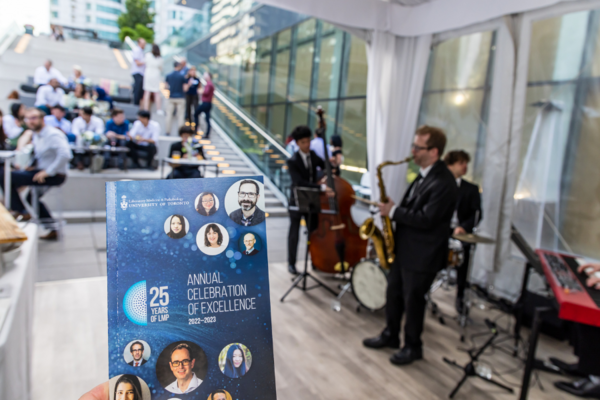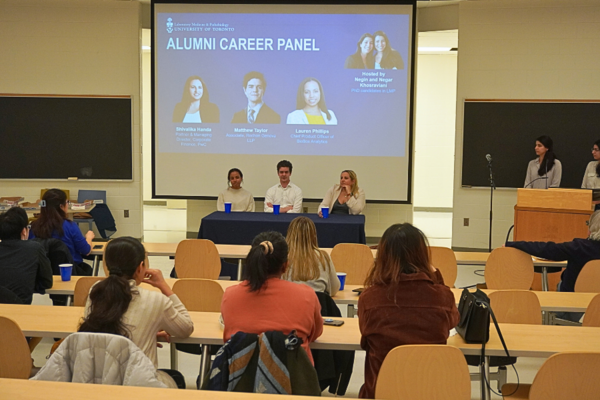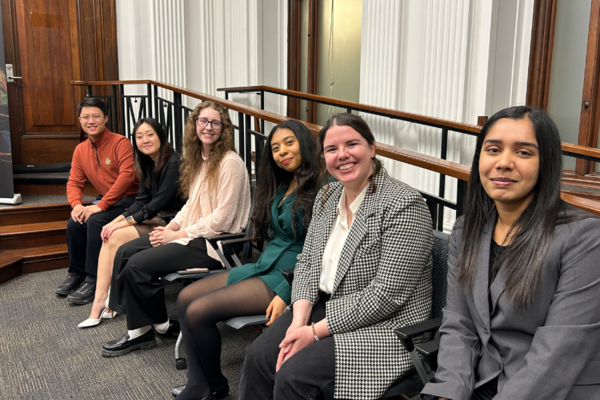LMP students recognized in University of Toronto Student Leadership Awards

The University of Toronto Student Leadership Award recognises outstanding student leadership, volunteer service, and commitment to the university. During the award’s 25-year history, it has celebrated the exemplary contributions of more than 4,000 students whose commitment and volunteerism had a lasting impact on their peers and the university. Students from the Department of Laboratory Medicine and Pathobiology have a great track record in receiving this award.
The 2024 recipients include undergraduate Specialist Program student, Sabrina Zhu, and Translational Research Program student, Abitha Suthakaran. Congratulations!

Sabrina Zhu
Specialist Program in Pathobiology
I joined the Specialist Program for the diversity and breadth of its curriculum which integrates elements of immunology, genetics, biochemistry, anatomy, etc. to investigate the etiology and molecular mechanisms driving disease, constructing a strong foundation to understand and further explore a myriad of diseases including cancer and neurodegenerative disorders. The program additionally encourages students to learn from leading scientists and engage in research projects with translational significance, for example, identifying proteomic therapeutic targets for child brain cancers. I am likewise very grateful for the smaller student cohort and the opportunity to learn from my incredible peers.
Throughout my undergraduate career, I’ve had the fortunate opportunity to contribute as an executive member to multiple student organizations and initiatives including Women in Science and Engineering, the Musical Minds Community Outreach program, the Trinity College Multicultural Society, the Trinity Review, and Snapshots @UofT. Through these roles and initiatives, I have aimed to amplify the voices of marginalized populations and underserved communities by improving accessibility to career and education opportunities and by providing empathetic and inclusive platforms for these individuals to express their needs, values, and narratives.
These activities have allowed me to identify and refine a leadership style that I personally resonate with - an empathetic and team-oriented leadership style which prioritizes and balances the needs and interests of team members to synergistically make decisions and plan events/initiatives. Through these leadership activities, I have strengthened my collaboration, communication, and problem-solving skills. I believe these skills are, not only highly translatable to a career in medicine or biomedical research, but also applicable to empowering fellow peers in developing their own leadership skills and potential.
In receiving this award, I am honored and immensely grateful to my family, friends, mentors, and team members for their support.

Abitha Suthakaran
Translational Research Program
During my undergraduate program I craved the opportunity to apply my clinical knowledge to make real, tangible impacts within healthcare. The Translational Research Program allows me to do exactly this. Through the program, I have learned how to perform contextual inquiry in specific patient populations, identify person-centric gaps in care, build trust and engage with research beneficiaries and stakeholders, and prototype low-fidelity interventions for validated needs and problems.
My goal with being involved at The University of Toronto has always been to foster a sense of community. Graduate school is so much easier to manage when you know there are people in your corner supporting you and encouraging you to grow. By being an active member of multiple committees, I have been able to engage students in activities outside of academics, from social and de-stressing events or advocacy and community service initiatives.
In true TRP fashion, I noticed a few “unmet needs” regarding student life in the first year of my Master’s. For example, after a few conversations with peers, I realized many students were struggling with their mental health. To address this, I joined the Health & Wellness Student Advisory Committee (HWSAC), part of University of Toronto's Student Health & Wellness Centre, where for two years I have provided feedback on Student Health policies and services to improve their accessibility, especially for graduate students. I also advocated for the rebrand of the TRP Fitness & Wellness Committee to the TRP Health & Wellness Committee to focus on more mental health-related initiatives (e.g., destressor events, therapy dogs).
Similarly, after noticing that members of different student groups in my program rarely know what’s going on in others, I helped streamline communications within and across all the groups to make them more accessible.
I believe leadership begins with listening, and through these activities, I’ve learned to actively listen to students, faculty, and alumni to understand their needs and address them. I’ve also learned how important it is to communicate with your collaborators to establish professional boundaries! It can be easy to overextend yourself, but knowing your limits and communicating them is key to [ensuring] productive leadership and avoiding burnout.
So many student leaders across the university work tirelessly “behind-the-scenes” to promote student wellness, whether that’s through planning events or revising policies. These leaders don’t do it to be acknowledged – they simply want to make a difference. Despite this, I feel incredibly grateful to be recognized among them for my own commitment to improving the TRP but also graduate life as a whole.
Find out more
The Specialist Program in Pathobiology
The Translational Research Program
This story showcases the following pillars of the LMP strategic plan: Inclusive Community (pillar 1) and Agile Education (pillar 5)



